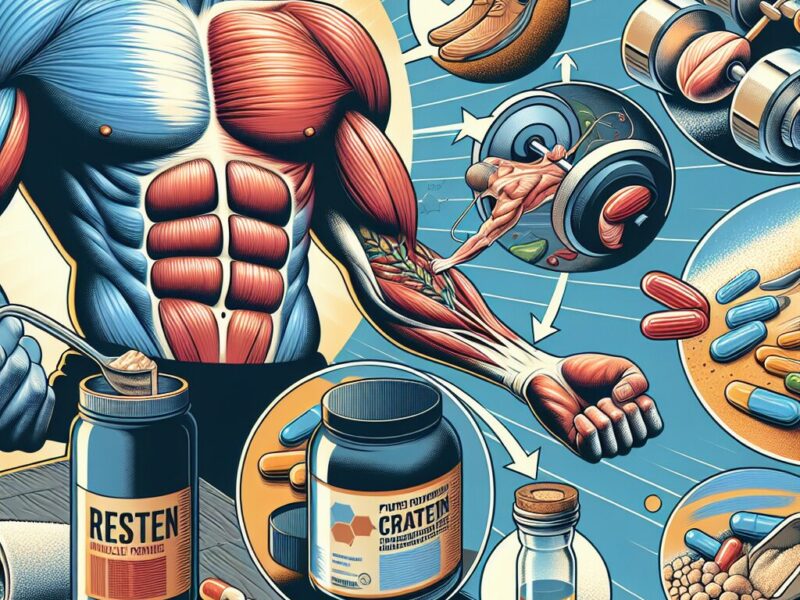Imagine a world where you can fuel your body with the perfect balance of nutrients it needs to thrive. A world where your energy levels are always high, your muscles are strong and defined, and your overall well-being is at its peak. This is the concept behind “Optimum Nutrition” – the notion that through careful and thoughtful dietary choices, you can achieve optimal health and vitality. In this article, we’ll explore the principles and benefits of optimum nutrition, and how you can incorporate it into your own lifestyle.
What is Optimum Nutrition?
Definition of Optimum Nutrition
Optimum nutrition refers to the state of providing your body with the necessary nutrients it needs to function at its best. It involves consuming a balanced diet that contains all essential nutrients in the right proportions. Optimum nutrition ensures that your body gets the right amount of macronutrients, micronutrients, vitamins, minerals, and water to support overall health and wellbeing.
Importance of Optimum Nutrition
Optimum nutrition plays a crucial role in maintaining good health and preventing various diseases. It provides your body with the fuel it needs to perform daily activities, boosts immune function, enhances cognitive function, promotes healthy growth and development, and supports a strong and efficient metabolism. Optimum nutrition is also essential for maintaining healthy body weight, managing chronic conditions, preventing nutrient deficiencies, and promoting overall longevity.
Components of Optimum Nutrition
Optimum nutrition consists of several components that work together to ensure your body receives the nutrients it needs. These components include macronutrients, micronutrients, and water.
Understanding Nutrition
Macronutrients
Macronutrients are the primary nutrients that your body requires in large amounts to support various physiological functions. They include carbohydrates, proteins, and fats. Carbohydrates provide energy, proteins support growth and repair, and fats serve as a concentrated source of energy and play a vital role in hormone production and nutrient absorption.
Micronutrients
Micronutrients are essential nutrients that your body needs in smaller amounts. They include vitamins and minerals. Vitamins are organic compounds that play a crucial role in metabolism, immune function, and growth. Minerals, on the other hand, are inorganic substances that are required for various bodily functions such as bone health, nerve function, and oxygen transportation.
Water
Water is an essential component of optimum nutrition. It is involved in various bodily functions such as digestion, absorption, and transportation of nutrients, maintenance of body temperature, and elimination of waste products. Staying hydrated is vital for overall health and ensures that all bodily systems function properly.
Sources of Nutrients
Whole Foods
Whole foods are natural, unprocessed foods that contain a wide range of nutrients. They include fruits, vegetables, whole grains, lean proteins, and healthy fats. Whole foods are rich in vitamins, minerals, fiber, and phytonutrients, making them an excellent source of essential nutrients for optimum nutrition. Consuming a variety of whole foods ensures that you get a diverse range of nutrients to support overall health.
Processed Foods
Processed foods are foods that have undergone various levels of processing and often contain added sugars, unhealthy fats, and artificial additives. While some processed foods may still contain nutrients, they are generally less nutritious compared to whole foods. It is important to limit the consumption of processed foods and focus on whole foods as the primary source of nutrients for optimum nutrition.
Supplements
Supplements serve as a convenient way to fill nutrient gaps in your diet. They can provide additional vitamins, minerals, and other beneficial compounds. However, it is important to note that supplements should not replace a balanced diet. They should be used as a complement to a healthy eating pattern and under the guidance of a healthcare professional if necessary.
Caloric Intake and Energy
Basal Metabolic Rate (BMR)
Basal metabolic rate (BMR) is the number of calories your body needs to maintain fundamental functions at rest. It accounts for the energy required for breathing, circulation, cell production, and other basic bodily functions. BMR varies depending on factors such as age, gender, body composition, and activity level.
Total Daily Energy Expenditure (TDEE)
Total daily energy expenditure (TDEE) refers to the total number of calories your body needs in a day, taking into account your BMR and physical activity level. TDEE includes the energy required for physical activity, digestion, and other daily tasks.
Energy Balance
Energy balance is the relationship between the calories you consume through food and the calories you expend through physical activity and daily tasks. When you consume the same number of calories as you expend, you are in an energy balance. To maintain a healthy weight, it is important to achieve energy balance by consuming an appropriate number of calories for your activity level.
Protein and Amino Acids
Importance of Protein
Protein is a crucial macronutrient for optimum nutrition. It is involved in various functions in the body, including the synthesis of enzymes, hormones, and antibodies, as well as muscle repair and growth. Protein also helps to regulate appetite and support weight management.
Complete vs. Incomplete Proteins
Proteins are composed of amino acids, which are the building blocks of protein. Complete proteins contain all nine essential amino acids that the body cannot produce on its own. Animal-based sources such as meat, fish, eggs, and dairy products are complete proteins. Incomplete proteins, found in plant-based sources like grains, legumes, nuts, and seeds, may lack one or more essential amino acids.
Essential Amino Acids
Essential amino acids are the nine amino acids that the body cannot produce and must be obtained through the diet. These include histidine, isoleucine, leucine, lysine, methionine, phenylalanine, threonine, tryptophan, and valine. Consuming a variety of protein sources, both from animal and plant-based foods, ensures that you get all the essential amino acids your body needs.
Carbohydrates
Types of Carbohydrates
Carbohydrates are a macronutrient that provides energy for the body. There are two main types of carbohydrates: simple and complex. Simple carbohydrates, commonly found in foods like fruits, refined sugars, and sweets, are quickly digested and absorbed, providing a rapid source of energy. Complex carbohydrates, found in foods like whole grains, legumes, and vegetables, are digested and absorbed more slowly, providing a sustained source of energy.
Glycemic Index
The glycemic index (GI) is a scale that measures how quickly a carbohydrate-containing food raises blood sugar levels. High GI foods cause a rapid increase in blood sugar, while low GI foods result in a slower increase. Choosing low GI carbohydrates helps to maintain stable blood sugar levels and provides a steady source of energy.
Fiber
Fiber is a type of carbohydrate that passes through the digestive system without being fully broken down or absorbed. It plays a crucial role in digestion, promotes feelings of fullness, helps regulate blood sugar levels, and supports a healthy gut. Fiber-rich foods include fruits, vegetables, whole grains, legumes, and nuts.
Fats
Types of Fats
Fats are a macronutrient that provides energy, supports hormone production, cushions organs, and aids in the absorption of fat-soluble vitamins. There are three main types of fats: saturated fats, unsaturated fats, and trans fats. Saturated fats, found primarily in animal-based products and some plant-based oils, are solid at room temperature. Unsaturated fats, found in foods like nuts, seeds, avocados, and oils, are liquid at room temperature and considered heart-healthy. Trans fats, found in processed and fried foods, are considered unhealthy and best to be avoided.
Functions of Fats
Fats serve several functions in the body. They provide a concentrated source of energy, help insulate and protect organs, support the absorption of fat-soluble vitamins, and serve as a structural component of cell membranes. Fats also contribute to the flavor and texture of foods, making them more enjoyable to eat.
Saturated vs. Unsaturated Fats
Saturated fats are often referred to as “bad” fats because excessive consumption has been linked to an increased risk of heart disease. These fats are solid at room temperature and are found primarily in animal-based products such as fatty meats, full-fat dairy, and butter. Unsaturated fats, on the other hand, are considered “good” fats and can be beneficial for heart health when consumed in moderation. They are found in foods like nuts, seeds, avocados, and plant-based oils.
Vitamins
Fat-Soluble Vitamins
Fat-soluble vitamins are vitamins that are soluble in fats and oils. They include vitamins A, D, E, and K. Fat-soluble vitamins are stored in the body’s fat tissues and can be stored for longer periods compared to water-soluble vitamins. They play a crucial role in various bodily functions, including vision, bone health, immune function, and blood clotting.
Water-Soluble Vitamins
Water-soluble vitamins are vitamins that dissolve in water. They include vitamins C and B-complex vitamins, such as thiamine, riboflavin, niacin, pantothenic acid, pyridoxine, biotin, folic acid, and cobalamin. Water-soluble vitamins cannot be stored in the body for long periods, so they need to be replenished regularly through food sources. They play vital roles in energy metabolism, immune function, and the production of red blood cells, among other functions.
Major Sources of Vitamins
Vitamins can be obtained from a variety of food sources. For example, vitamin C is abundant in citrus fruits, strawberries, and bell peppers, while vitamin A is found in fruits and vegetables with vibrant orange and yellow colors, such as carrots and sweet potatoes. Vitamin D can be obtained from sunlight exposure, fortified dairy products, and fatty fish, while vitamin E is found in nuts, seeds, and vegetable oils. Vitamin K is abundant in leafy green vegetables and can also be produced by gut bacteria.

Minerals
Major Minerals
Major minerals are minerals that are required in larger amounts by the body. They include calcium, phosphorus, potassium, sodium, magnesium, and chloride. These minerals play essential roles in bone health, fluid balance, nerve function, muscle contraction, and pH regulation. Consuming a balanced diet that includes a variety of whole foods typically provides adequate amounts of major minerals.
Trace Minerals
Trace minerals are minerals that are required in smaller amounts by the body. They include iron, zinc, copper, manganese, chromium, selenium, iodine, fluoride, and molybdenum. Although they are needed in smaller quantities, these minerals are still essential for various bodily functions. Trace minerals can be obtained from foods such as lean meats, seafood, whole grains, nuts, and seeds.
Functions and Sources of Minerals
Minerals are essential for the proper functioning of the body. For example, calcium and phosphorus are vital for bone health, iron is necessary for oxygen transportation, and zinc supports immune function. Major minerals can be found in a variety of foods, including dairy products, fruits, vegetables, and whole grains. Trace minerals are present in various foods but are often found in higher concentrations in animal-based sources and certain plant-based foods.
Hydration
Importance of Hydration
Staying hydrated is crucial for optimum nutrition and overall health. Water is involved in numerous bodily functions, such as nutrient absorption, temperature regulation, waste elimination, and joint lubrication. Adequate hydration helps maintain proper organ function, supports digestion, and aids in cognitive function. It is important to replenish fluids regularly to prevent dehydration.
Water and Electrolyte Balance
Water and electrolyte balance go hand in hand. Electrolytes are minerals that carry an electric charge in the body and include sodium, potassium, chloride, calcium, and magnesium. They help regulate fluid balance, nerve function, muscle contraction, and pH levels. By consuming an adequate amount of water and electrolytes through fluids and nutrient-rich foods, you can maintain proper hydration and electrolyte balance.
Recommended Fluid Intake
The recommended fluid intake varies depending on factors such as age, gender, activity level, and climate. On average, it is recommended to consume at least 8 cups (64 ounces) of fluid per day. However, individual needs may vary, and it is important to listen to your body’s thirst cues and increase fluid intake during times of increased physical activity, hot weather, or illness.
In conclusion, optimum nutrition is vital for overall health and wellbeing. It involves consuming a balanced diet that provides all essential nutrients in the right proportions. Understanding the different components of nutrition, such as macronutrients, micronutrients, vitamins, minerals, and water, is essential for achieving optimum nutrition. By choosing whole foods, limiting processed foods, considering supplements if necessary, and understanding factors like caloric intake, protein, carbohydrates, fats, vitamins, minerals, and hydration, you can promote optimum nutrition and support your overall health. Remember, small changes in your diet and lifestyle can make a big difference in achieving and maintaining optimum nutrition.



